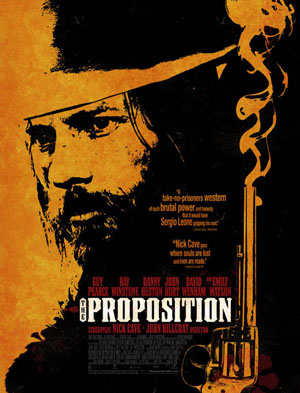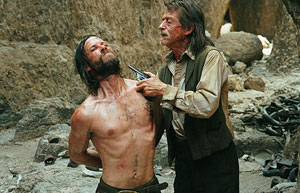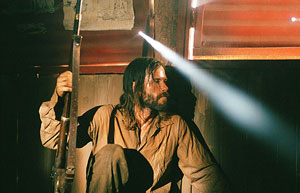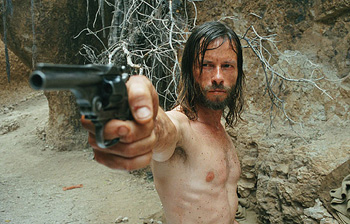 I think the last time I saw Guy Pearce running around the desert he was in a dress and singing ABBA tunes. The Proposition is a bit different from The Adventures of Priscilla, Queen of the Desert – this Aussie western has him playing Charlie, a guy who is the hero of the movie only because he’s slightly less murderous than the villains. Charlie’s an outlaw, part of a gang with his brothers. Before the movie starts something breaks that gang up, and Charlie and his younger, soft brother are captured by the authorities. They give Charlie a proposition – go and find the eldest and craziest brother and kill him and they won’t hang the younger brother.
I think the last time I saw Guy Pearce running around the desert he was in a dress and singing ABBA tunes. The Proposition is a bit different from The Adventures of Priscilla, Queen of the Desert – this Aussie western has him playing Charlie, a guy who is the hero of the movie only because he’s slightly less murderous than the villains. Charlie’s an outlaw, part of a gang with his brothers. Before the movie starts something breaks that gang up, and Charlie and his younger, soft brother are captured by the authorities. They give Charlie a proposition – go and find the eldest and craziest brother and kill him and they won’t hang the younger brother.
All of that is laid out in the first few minutes of the film. Everything else is about the choices and repercussions of that proposition, and it’s almost all violent, squalid and dirty.
I talked with Guy Pearce on the phone last week, completing my triumvirate of exclusive interviews for The Proposition (check out co-star David Wenham here and director John Hillcoat here). Guy was chatty as anything, and I think he would have stayed on the phone a lot longer. I know I could have asked him many more questions. Sadly, I had people waiting for me to go to dinner. I’ll make it up to you next time, Guy.
Pearce: What city are you in?
Q: I’m from New York City, but I’m actually in North Carolina today.
Pearce: Ah. I did a movie once that was set in North Carolina, but we filmed it in Austin, Texas, and we never actually got there.
Q: I’ve been to Austin and it looks nothing like North Carolina.
Pearce: That’s what they would tell us. We had to go and find some areas that vaguely resembled North Carolina. Q: Which film was that?
Q: Which film was that?
Pearce: A film called A Slipping Down Life, which we made in 98. With Lili Taylor. It was a sweet little film.
Q: I don’t think I would The Proposition a sweet little film.
Pearce: Far from it, really. It’s quite a disturbing piece of work.
Q: It is. There are some actors who only want to play roles where they are unambiguously good guys, but you’re willing to take on roles like this where you’re anything but unambiguously good. When you’re playing a character as nasty and murderous as yours in The Proposition, can you understand where he’s coming from?
Pearce: Yeah, I think so. To a certain extent. In talking to our director John Hillcoat and getting an understanding of what life was like for people in that period, where survival was different to what we know it to be today. Particularly for someone like me – there are people obviously who are more closely related to Charlie living today in various parts of the world. But talking to John, and getting a sense from him, as well as looking at all the research he supplied – he supplied lots of reading matter that delved into police reports and crimes that occurred at the time, you get a sense that it was a whole different world, especially in that harsh landscape. Especially where the landscape itself is kind of violent, in a way. It’s just less civilized, and becoming civilized on some level means getting away from the elements. I think these people on some level live on the land like wild animals do, and there’s a harshness and a shocking level of violence. You only have to look at a documentary on tigers, for example, and then wonder what if we lived like that – if we walked down the street and leapt out and attacked somebody and ate them!
It’s quite odd in a way, but when you relate it to having to survive, you can make sense of it to a certain extent. At least to the point where you can portray it in a film. Obviously by the time the film has started some sort of split has occurred between Charlie and his brother. We see that Charlie has taken his younger brother away from Arthur, the elder, for want of a better term psychotic or crazy brother. He doesn’t appear to Charlie to have as much moral fiber as he. Arthur talks about family and justifies things in terms of family. I’m sure that’s always been a struggle for Charlie because Arthur is far more well-read, and quite articulate and a very powerful and persuasive presence. It’s a tricky, sort of complicated relationship the three brothers have going on, but one I felt I could tap into based on the great script and the material we looked at from the period.
Q: The Proposition is in many ways an indictment of colonialism, looking at the violence and racism that go hand in hand with conquering this country. Australia and America have that in common – do you think that’s something a nation can get beyond, or does it stain the nation forever?
Pearce: That’s a really interesting question, I reckon, because there’s always the commentary that you’ll get on various radio stations here in Australia or on the news that I think, on some level, heroically won’t let that stuff go. But at the same time we have to learn on some level to accept it, or at least discuss it. It has to be brought to the forefront. I think it will always remain a hideous stain on the history of this country – and it’s one thing to say we feel the stain of this as white people, but you can’t ignore what the traditional owners of the country must feel about it. I’ve certainly spoken to many aboriginal people about the general underlying resentment that exists because of the way they were overturned and the way they were treated and taken over. As much as we have our sort of psychology to try and get our heads around, there’s the feelings of the indigenous folk who were here 60,000 years before we got here. It’s obviously going to be a very deep wound for a very long time, and one that probably will be resolved in ways that we can’t fathom at this stage.
I think the way you learn Australian history in school as a kid doesn’t help that. There are still some narrow minded and still some very racist folks out there that are teaching a very skewed view of what actually happened to very young kids. And that’s never going to help, you know?
Q: It’s fascinating how similar America and Australia are in that regard. We still have a lot of the same issues in our educational system.
Pearce: Yeah, absolutely. And I can understand in a way why that happens. For people it’s difficult to open up and be emotional about what’s gone on before, especially if you’re feeling incredible guilt. At the same time, that doesn’t make it right. It doesn’t help! [laughs]
Q: Are you the kind of actor who has a hard time shedding a role? I read that after The Factory you were signing soup cans as Andy Warhol.
Pearce: That was a gift for all the crew. I was still actually in the film – it was my second to last day or something.
It depends. I have an overwhelming desire to get out of the role, to shed the role. It’s an overwhelming desire to get something out of your system, to put it down. I never really understood actors who kept the costume after the movie. At the time I don’t want to look at that stuff again. On some level it would be nice to have a little closet somewhere where you kept costumes from the jobs that you’ve done, or at least one from each job. But at the time it’s the last thing I want to see – I pack my bag and get on the plane and come home, you know? Having said that, I did keep a pair of the boots I had in the Andy Warhol film, but only because I feel like I can wear them in everyday life. So it’s the first and only thing that I’ve ever kept.
But sometimes it’s really hard to shake the physical aspects of the character, and the voice. In the past I’ve done too many jobs back to back and it was just impossible to take on something new when I still had the old character swimming around in there. I realized the best way to shed a character is to come home and slowly let it dissolve out of you. Then you find that your own personality rises again to the surface, and it’s through your own personality that you’re able to find the next job to do. I think reading scripts when you’re working on something is really, on some level for me, inappropriate, because I have a skewed view of what I’m reading because of the role I’m playing. I’ve learned to take time off between jobs.
In the past I’ve done too many jobs back to back and it was just impossible to take on something new when I still had the old character swimming around in there. I realized the best way to shed a character is to come home and slowly let it dissolve out of you. Then you find that your own personality rises again to the surface, and it’s through your own personality that you’re able to find the next job to do. I think reading scripts when you’re working on something is really, on some level for me, inappropriate, because I have a skewed view of what I’m reading because of the role I’m playing. I’ve learned to take time off between jobs.
Q: Have you sort of soured on the big budget Hollywood films? Has The Time Machine turned you off from the bigger films?
Pearce: I wouldn’t say it soured me. It certainly wasn’t a great experience, but it opened my eyes more to listening to my own intuition. I’m certainly not opposed to doing a big studio film, but I don’t tend to get offered good big studio films, I tend to get offered stuff that isn’t necessarily stuff I would want to go see. I am drawn to smaller, more independent stuff, because I think they take more risks in the storytelling. Which isn’t to say that big studio films don’t take risks, but they’re going to want to have a real security in the cast that they pick, and I don’t necessarily fall into the category of folks that are a safe bet. If I do get offered a big studio film it’s usually a thing that doesn’t have the money to pay Brad Pitt, but they’ll have the money to pay me. So I get offered it and Brad Pitt wouldn’t want to do it anyway because it’s crap!
 Q: There’s one big studio film that your name keeps getting attached to, and I’m sure you’ve heard this a million times – Batman 2.
Q: There’s one big studio film that your name keeps getting attached to, and I’m sure you’ve heard this a million times – Batman 2.
Pearce: [laughs]
Q: Is this just the kind of usual BS that goes around when a movie is getting prepared? Or have you been in touch with Christopher Nolan about it?
Pearce: There’s certainly no talk on my end, and no one has approached me about it. It feels like a repeat of when Chris did the first Batman, because once people knew he was doing the first one they automatically associated any actor who’d worked with him before and obviously Memento is a fairly prominent film in Chris’ history. So I seemed to come up. And literally it was one of those cases where a friend called me up and said, ‘I saw on the internet that you’re going to play Batman.’ ‘What? Really?’
It happened again a couple of weeks ago when I was in the States doing publicity for The Proposition. A few journalists mentioned it to me, but I hadn’t heard anything about it.
Q: Your name is one that fans keep bringing up. Is that flattering to you, that you’re someone they would like to see in one of the iconic villain roles?
Pearce: Oh, yeah. Absolutely. I can’t ignore that the people respect stuff that I’ve done or what I could do. That’s really flattering, absolutely. But unless Chris and the producers have talked about it and haven’t gotten to me yet – which I don’t think is the case!